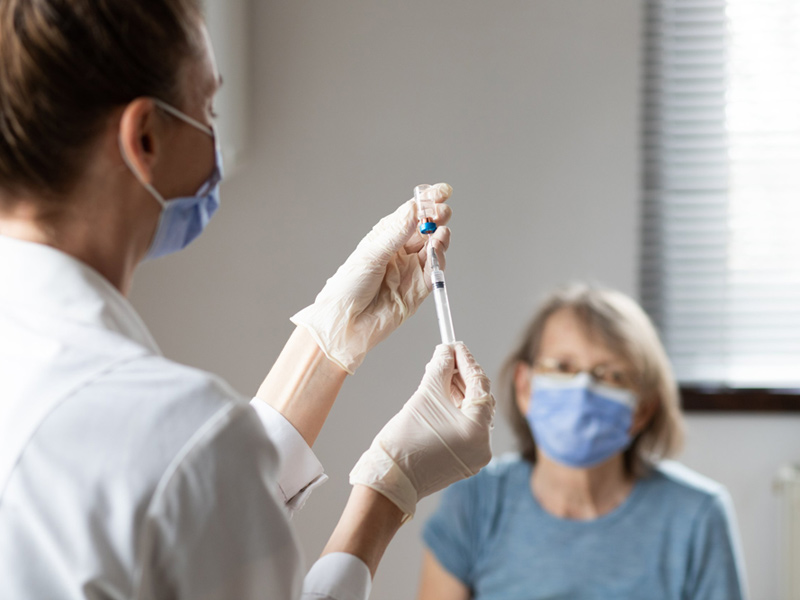CDC Committee Recommends Enhanced Flu Shot for Seniors
ACIP Updates Guidance for COVID, MMR, Pneumococcal Vaccines
June 30, 2022, 5:15 p.m. David Mitchell — High-dose, quadrivalent influenza vaccines aren’t new, but they likely will carry a new recommendation into the coming flu season.

During its June 22-23 meeting, the CDC’s Advisory Committee on Immunization Practices made a preferential recommendation that such vaccines be used in patients 65 and older. It’s the first time the committee has made such a stipulation for this age group.
The ACIP’s recommendation states that patients 65 and older should receive Fluad Quadrivalent, Flublok Quadrivalent or Fluzone High-Dose Quadrivalent. The committee did not indicate a preference for one particular high-dose vaccine.
Pamela Rockwell, D.O., of Ann Arbor, Mich., the AAFP's liaison to the ACIP, said the committee made the recommendation based on evidence that high-dose, quadrivalent influenza vaccines are more effective in individuals 65 and older compared to standard trivalent flu vaccines. However, she noted that if none of the preferred high-dose vaccines are available, immunizing patients in this age group with any other age-appropriate influenza vaccine would be better than not vaccinating them at all.
Patients 65 and older are at increased risk for severe illness, hospitalization and death due to influenza. According to the CDC, between 50% and 70% of flu-related hospitalizations and between 70% and 85% of flu-related deaths have occurred among patients in this age group in recent years.
Story Highlights
The ACIP’s recommendation is subject to review and approval by CDC Director Rochelle Walensky, M.D., M.P.H. The agency’s approved final recommendations for seasonal flu vaccines are expected to be published in a Morbidity and Mortality Weekly Report later this summer. After publication, the AAFP will review the recommendations for possible approval.
COVID Vaccines
It has been a busy month for the ACIP, which also met June 17-18 specifically to take action on FDA approval of COVID-19 vaccines for children ages 6 months to 5 years.
In its June 22-23 meeting, the ACIP took two votes after the FDA issued emergency use authorizations related to COVID vaccines for youths. The committee voted unanimously to recommend Moderna’s two-dose, 50 microgram COVID vaccine for children ages 6-11 years and also to recommend Moderna’s two-dose, 100 microgram COVID vaccine for adolescents ages 12-17.
Children ages 6-17 who are moderately to severely immunocompromised should receive a third dose of vaccine 28 days after their second dose.
The AAFP has approved the advisory committee’s recommendations regarding COVID immunizations, and the Academy’s COVID vaccine webpage has been updated with the latest recommendations related to the pandemic, as well as new resources that include a COVID-19 vaccination schedule.
Two other ACIP recommendations from the June 22-23 meeting would give clinicians additional options for vaccinating patients against pneumococcal disease as well as measles, mumps and rubella. Those recommendations are expected to be part of the CDC’s 2023 immunization schedules and will be reviewed by the AAFP after final CDC approval.
MMR
The ACIP voted unanimously to recommend GSK’s Priorix, which was approved by the FDA earlier this month, for people ages 6 months and older. Previously, Merck, which produces M-M-R II and ProQuad, was the only manufacturer of MMR vaccines approved for use in the United States.
Rockwell said the ACIP’s MMR work group presented evidence that redundancy in the U.S. supply chain was needed to protect public health following multiple interruptions to Merck’s manufacturing operations.
Priorix, she said, has a similar safety profile and is considered noninferior to M-M-R II and should be beneficial in maintaining measles and rubella elimination and mitigating mumps outbreaks. It also offers a gelatin-free alternative to M-M-R II, which she said is important to some religious groups.
Rockwell noted that Priorix already was considered fully interchangeable with M-M-R II in many countries. First licensed in Germany in 1997, the vaccine has been approved in more than 100 countries with more than 400 million doses distributed worldwide.
Reported incidence of measles and mumps have declined dramatically during the pandemic, likely due in part to social distancing, masking and other COVID-19 mitigation efforts, Rockwell said.
MMR vaccination rates also have declined during the pandemic, according to the CDC, leaving unvaccinated children potentially at risk when COVID mitigation efforts end. Parents may be tempted to avoid health care settings due to concerns about COVID-19, so Rockwell said reminders and outreach may be necessary.
“Many children missed check-ups and recommended childhood vaccinations during the past two years,” she said. “Reminder and recall systems should be implemented to identify patients who are due for or who have missed vaccine doses. Reminders and recalls can be delivered in different ways, including telephone, letter, postcard or text message.”
Rockwell said the vaccination status of all patients should be assessed at every health care visit to reduce missed opportunities for vaccination, and the use of standing orders may improve catch-up vaccination efficiency.
Pneumococcal Disease
The ACIP voted unanimously to recommend Vaxneuvance, Merck’s 15-valent pneumococcal vaccine that was approved by the FDA the same day for infants and children ages 6 weeks to 17 years.
Vaxneuvance was deemed noninferior to Prevnar 13, Pfizer’s 13-valent pneumococcal conjugate vaccine, and either vaccine can be used in a four-dose series at ages 2, 4, 6, and 12-15 months.
Rockwell noted that the two vaccines have similar efficacies for the 13 serotypes covered by PCV13. In addition to covering two additional serotypes (22F and 33F), the PCV15 vaccine is expected to cost less, according to information presented during the meeting.